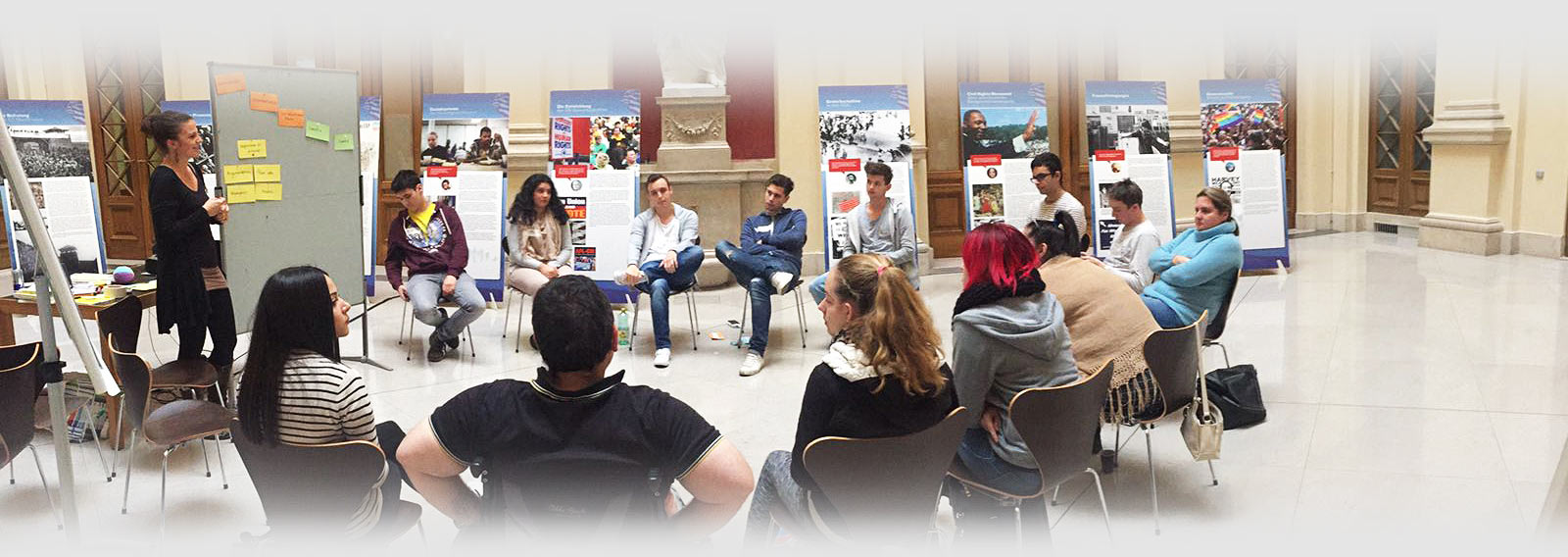Research
The Austrian Mauthausen Committee (MKÖ) is dedicated to researching the history of Mauthausen concentration camp and its sub-camps. Working in cooperation with the University of Linz, the MKÖ organised a symposium series between 2006 and 2009. Each year the symposium had a special focus that was discussed by leading academics.
2011: The Network of Terror
The National Socialists established a network of concentration camps, extermination camps, and a series of offices and organisation for the exclusion, persecution and annihilation of political dissidents, people persecuted on racist grounds and others who found themselves for myriad reasons excluded from society.
The "network of terror" is not only meant in relation to Mauthausen concentration camp, rather the close connections between all the concentration camps, and the wider camp system, including forced labour camps, "Eastern" worker camps, special camps for Jews or Gestapo camps. The camps worked closely together, exchanging information, prisoners and guards.
As well as the institutional framework of persecution there existed an informal, wide-ranging network of informers, perpetrators and facilitators – a network without which recent research has shown the institutional network would not have been able to function in the way it did.
Working on this informal network led us inevitably to the terms "civil courage" and "freedom of choice" whereby it was clear that those working within this network did (almost) always on a voluntary basis.
Current Aspects
"Civil courage" and "freedom of choice" remain as important today as they ever have been. Be it in the everyday context of everyday racism or xenophobia or whether it's the fight against a new network of terror, the well organised and Europe-wide network of far-right extremists.
This fight is a political one, not to be fought through political parties, rather it is a fight for democracy and equal rights and against exclusion and violence. Therefore, the negative institutional and informal networks of the far-right extremists should be opposed by a positive example of an informal network of people, throughout Europe, working for "civil courage" and "freedom of choice".
This formed the key theme of the symposium held in Linz on 6th May 2011.
2009: Resistance against National Socialism on religious grounds
The memorial and liberation commemorations at the Mauthausen former concentration camp in 2009, on the occasion of the 63rd anniversary of the liberation of Mauthausen and its sub-camps, was dedicated to the topic of resistance to National Socialism on grounds of religion. The main focus was people and groups of people who were sent to Mauthausen or one of the 49 sub-camps as a result of religious resistance and includes people from a wide range of religions: Christians, Muslims, Jews, Jehovah's Witnesses. It is not only members of the respective clergies – such as priest, monks, nuns etc. – who are included, rather the focus is on the many lay people who resisted the Nazi regime on the grounds of their religious conviction.
This formed the key theme of the international symposium "Freedom Lies in the Deed Alone" which took place in cooperation with the University of Linz on 8th May 2009.
2008: European Resistance and Mauthausen Concentration Camp
The topic of resistance can be approached from many different perspectives. Of particular importance to this symposium was that the focus lay not only with armed or military resistance, but that it incorporated as many different facets and aspects of resistance as possible. This includes non-organised resistance, acts of resistance carried out by individuals. The topics of collaboration and the role played by the silent majority were also addressed.
2007: Artists and Academics in Mauthausen Concentration Camp
As the theme for this symposium offers a very wide-ranging potential for discussion, the focus was not on specific aspects, but was rather an attempt to get a comprehensive and current overview of the topic as it stands. Central were not only approaches such as biographical research of those deported to Mauthausen concentration camp as artists and academics, but also those who followed those career paths after liberation. As well as discussing the biographies of prisoners and former prisoners, the symposium will also address the points of conflicts between "academia and art under National Socialism", the destruction of intelligence produced by those considered "inferior" peoples and the academic or artworks produced by those relating to their concentration camp experiences.
2006: Women in Mauthausen Concentration Camp
Prisoners from the concentration camp on the Loibl Pass
Eyewitness Project: The Mauthausen Concentration Camp as it was perceived by the local population
"You just had to live with it ..."
Sub-camps of Mauthausen Concentration Camp as perceived by the Local Population.
A study by Andreas Baumgartner and Rudolf Kropf
The investigation of the relationship between the local population and the sub-camps of the concentration camp Mauthausen forms the central topic of this study, covering the strategies, involvement, perceptions of the camps and attempts to help people. The interviews cover three periods of the camps: pre-1938 (socialisation, beginning of illegal activities, etc.); the period 1939-1945 (perceptions of the camp, involvement and help); and the period following the liberation in 1945/46 (discovery, coping strategies).

